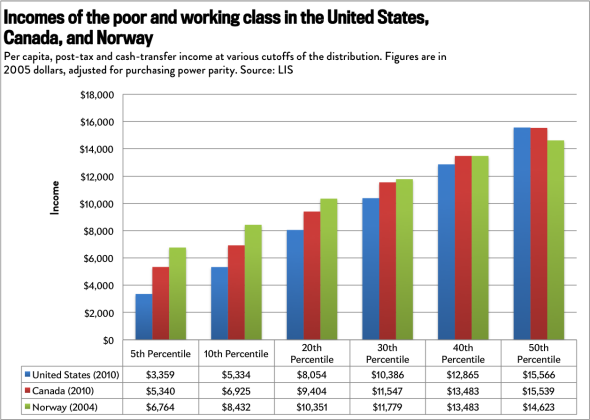Bofferbrauer2 said:
1. Problem is that millions of jobs only pay minimum wage. Botht hose people and the economy as a whole depend very much on those. Corporate taxes got decreased very very much over the last decades. Trump just slashed it from 35% to 21%, so in effect almost halved the corporate tax. But by your theory the wages would have been increased in a similar motion. Where are those wage increases, I ask you? Answer: nonexistent, as they are not obliged in any way to pay them more. The brunt of this tax cut goes into executives and shareholder pockets, the rest into investments, buybacks and liquidity reserves. Normal employees get zip out of those tax cuts. 2. a. You have to consider that those poverty lines are arbitrarily set by the state. But extreme poverty is real in the US much more than any other developed country. The reason is the welfare state, or lack thereof in the US. While the rest of the world provides some bottom line which allows people to live, what they get in the US had been described as "too much to die, not enough to live". Just check how low the US bottoms out on this chart:
This is the result of the inadequate US social security and welfare state. And yet republicans want to further cut that down. b. Investments don't always work out. Yeah, but that's not the problem. The problem is that you need to have some expendable income to be able invest something in the first place. c. Believe me, they do. But finding a job is not always as easy as you seem to think, especially not if your skillset is too limited or outdated. 3. It took 6 years to get unemployment in the US back to pre-recession levels of 2006. If you're unlucky that means over 5 years of unemployment for you. Of course the recession will go away after a while, but it's effects linger around for much longer than you think. 4. What if you can't afford those medicines? That's what universal healthcare is supposed for, after all. But not in the US, apparently. About the addiction, you know how the opiate crisis started? With prescription drugs containing opiates as extra strong painkillers. They were supposed to give out the opiates very slowly and not make anyone addicted to them. But those who couldn't swallow the pills crushed them, and only then it got found out that when crushed, the retardent wouldn't work (and wasn't strong enough anyway, so anybody with very strong pains was at risk of getting highly dependent on those medicines). Oh, and both the right for painkillers and the allowance for opiates in painkillers stem from unipartisan republican legislation under Bush junior. 5. Only if their wages raise with it. Otherwise only the price of living will go up for them. 6. Not enough to live from. Also, charity only helps against the symptoms, but not the underlying causes of social injustice, which welfare tackles. http://www.bbc.co.uk/ethics/charity/against_1.shtml This is also why international aid nowadays doesn't just send money into poverty-strick regions, but instead tackle on their own infrastructure to give a groundwork for further development, and bring food for the hungry in a starvation to ensure it's not getting squandered onto other tasks or pocketed by the local governments. You also don't seem to understand that it's not just a handout. You could make it like in Luxembourg, where you get unemployment aid, but you have to register at the unemployment office, go there every time they call you and go to every job offer they send you (unless on sickness leave, but then you need to send them the doctor's notice), lest you get either reduced aid or no aid at all for a couple months if you're a repeating offender. This is to make sure you're serious about looking for work and not sitting around, waiting for charity donations to trickle in. |
1. Minimum wage jobs are not mean't ot sustain people for long periods of time. They are not supposed to be careers.
Wages have began to increase though, not as much as the corporate tax cuts but thats becuase some of the tax money will go to other avenues of the company. But the wages did increase which is still good.
2. a- Poverty is still a good indication of of how someone stands in society compared to others around and based on where they live. Also that chart you posted is showing US statistics from 2010 when we were still trying to get out of a recession. It does not really paint a clear picture of the situation now.
b- If you invest even a small amount of your paycheck it can still help you in the long run regardless.
c- This is why if we invest in communities we can help teach people useful skill and push them in a way that they can pursue a higher education.
3. Im pretty sure it's unlikely that a decent amount of people were unemployed for five straight years during the recession. President Obama was doing a good job at creating new jobs during the recession.
4. Universal healthcare needs to happen. I'm not disagreeing with that.
5. People getting prescription to strong painkillers is the pharmaceutical industries fault. But if you find out that these drugs are bad for you and don't cut down then you're at fault for harming yourself when you know it isnt good for you.
6. Im not suggesting people should depend on charities. All im saying is that if we get rid of the welfare state and replace it with programs that push people to a better path and charities can also help these people then I think it would be better for the poor and middle class. This would also help reduce wealth inequality.
Everything I have said in this post I have already addressed so i'm just repeating myself now. But I understand what you guys are trying to say. There are a lot of wealth inequality so people may not be able to save up for retirement and when people are unemployed or working minimum wage it should be the government's job to provide them financial aid. I do agree with you two that the government should help the people but I think we are disagreeing on how they should help the people. In my opinion the way welfare is does not really push people to change their situation. Welfare is like a bandage to stop the bleeding. If we were able to get rid of most welfare programs and social security then we cut income taxes which will help the middle class and some of the poor. We can also eliminate sales tax which would help a lot of poor people but sales tax is handled by the states so that would be tricky. Anyways if we do this then the government can invest in poor communities by starting programs that allows people to have acess to free pre-k, free rehabilitation, job training and job opportunities, and programs that help people pursue a higher education. These types of prgrams are not just throwing free stuff to those in need but are giving them opportunities that they can take advantage of that would help them and their family more in the long run. If you can keep someone off the streets and in a learning enviroment they will be liekly to pursue higher education and get a good job and come back to help their community. A lot of rappers I listen to do this and it's pretty cool.


















